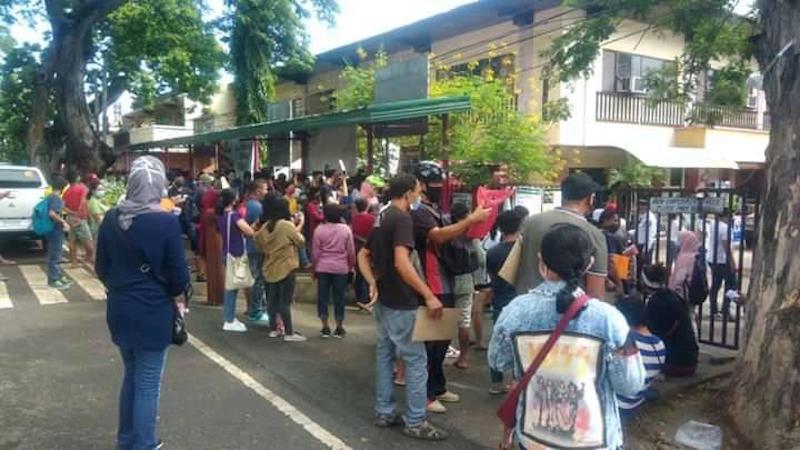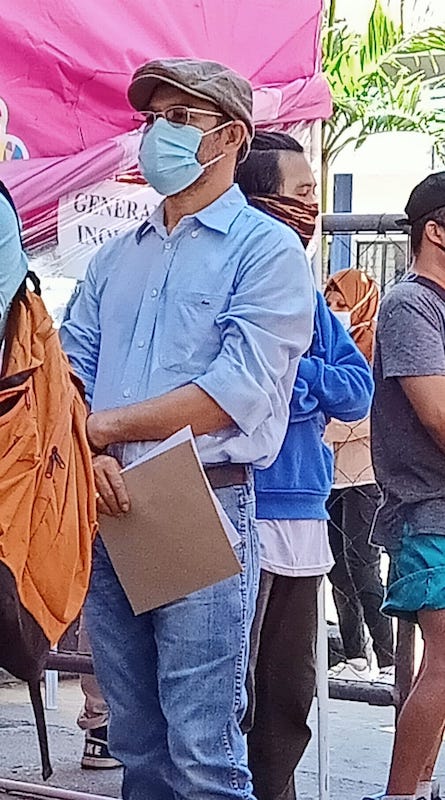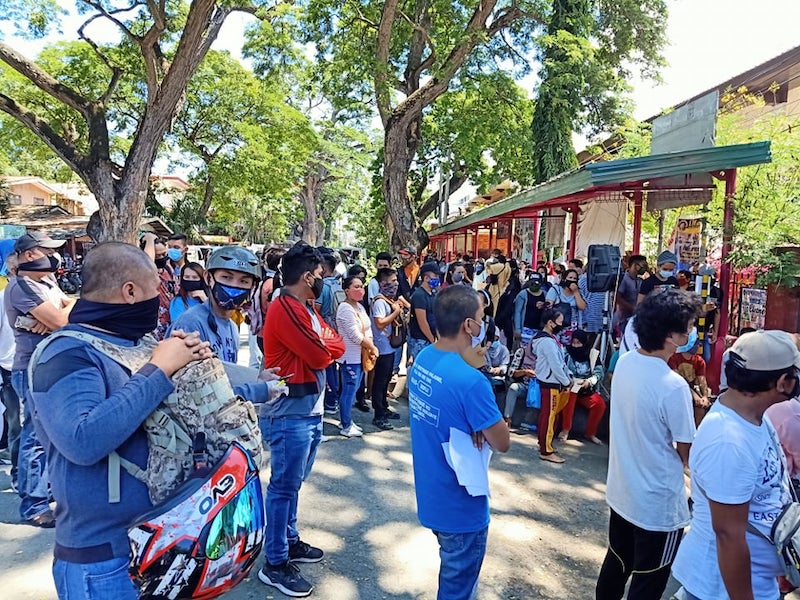ZAMBOANGA CITY (MindaNews / 04 June) — Local stranded persons house-arrested for already more than 70 days are desperate to leave Zamboanga City, hoping to be relieved of its strict Quarantine protocols. Most are already horrified and scared of the city’s own self-prophesizing as epicenter of COVID-19 in Western Mindanao, a claim apparently backed by local medical experts predicting for the contagion to peak to a high crest this June.
Locally Stranded Individuals (LSIs), mostly residents of neighboring islands, are crowding to be first in line to get Medical Clearances and Exit Permits to be back in the safety of “low-risk” provinces in Sulu and Tawi-Tawi.

This photograph shows the situation at 8 a.m. on Tuesday, 02 June 2020, outside of the Oficina de Salud (City Health Office). Similar situations are also happening in the Zamboanga offices of the Department of Interior and Local Government (DILG) and Philippine National Police (PNP), on the first week since protocols have been relaxed nationwide by National Task Force, including among others, allowing maritime travel and lifting the bans on local interisland transportation which sea-bounded Sulu and Tawi-Tawi, south of Zamboanga, have adopted but are hampered at Zamboanga City’s gate.

The city has remained adamant and stuck to its own protocols redefining its GCQ (General Community Quarantine) set-up as stringent as one it has adopted since lockdown days in March. Zamboanga City’s Quarantine policies allow people to go out at only one person per household, and only on alternate days to transact official business. In Zamboanga City, pedestrians with no Quarantine passes have been apprehended at checkpoints while local jeepneys have their license confiscated for innocently boarding up passengers with Quarantine passes but coming out on the wrong day.
Zamboanga City and Davao City are the only areas in Mindanao that have been classified “medium-risk” and areas still under GCQ. The rest of Mindanao are under Modified General Community Quarantine (MGCQ).
Now that most of us are under MGCQ and hopefully transitioning to the new normal, the Local Government Units (LGU) and local Inter-Agency Task Forces (IATF) may now have time to give attention to their stranded constituents. Timely tips for stranded islanders in Zamboanga City are called for.
To get an Exit Authority from the host LGU (in this case, Zamboanga City), one has to accomplish the following:
- Barangay Certification where one was stranded and attesting that one completed House Quarantine for at least 14 days
- Chest X-ray at designated Lab. In Zamboanga City, the Zamboanga Children’s Hospital along Pilar street is the City Health Office (CHO)-recommended X-ray facility 3. Online appointment with Zamboanga City Health Office. Wait for appointed schedule for health clearance, and finally for issuance of Medical Certificate. Walk-in clients have also attempted and braved the long queue. But paper documents needing physical appearance proved too long to be done and finished in the privileged days that are imposed on us who are entitled only one pass per household and regulated to be out only on designated alternate days. But since only two alternate names can hold a pass, some LSI applicants who are not even named as Quarantine Pass holders are in a quandary.
- Once you have your Medical Certificate, consider that you are just about 20% to your goal. The next step is to get the Exit Authority. First note: Your Exit will only be allowed if there is already available transportation. Second note: your Medical Certificate has an expiration of 14 days ( equivalent to Quarantine days).
- Now the next level is to go to DILG/PNP for documentation and issuance of Exit Authority. The office is near the Post Office. LSI must present proof of residency in destination LGU: Barangay ID or Employment ID and/or certification.
- Contact your Local IATF at LGU of destination for Travel Authority. Be ready with electronic copies of all your documents as everything will be processed online.THESE Procedures are tedious and ONLY literate and documented citizens might be able to comply and may be privileged to come home for the meantime. The port management and embarkation procedure is yet another hurdle for the returnees. At the seaport, group check in appears more advantageous to already distressed and harassed passengers as the procedures before the Joint Task Force Shield is very military and highly stressful. Psychosocial support desks should be readily available to assist LSI from vulnerable sectors.
Given all these, the LGUs and local IATFs should innovate and come up with alternatives to facilitate and make the procedures accessible and equitable to all. A strategic key may be decentralization to prevent clogging of task under one office, and clustering of transaction to prevent crowding of applicants in one area.
For stranded government employees, local agencies or offices might consider creating their own Task Force, empowered to process the transactions through their Human Resources Department. Or at least transactions that do not need physical appearance can be done by group or in bulk. Zamboanga City and other LGUs might want to consider a de-centralized procedure by enabling satellite processing sites such as DOH in Upper Calarian, while another can be set up to cater to the East Coast cluster. The same can be had with DILG-PNP where corresponding desks could attend to Travel Authority procedures, and making it a one-time shopping mart.
Shortly before the Inter-Agency Task Force on the Management of Emerging Infectious Diseases (IATF-MEID) shifted the rest of Basilan, Sulu, and Tawi-Tawi into an MGCQ mode on June 1, 48 teachers and students successfully crossed the Sulu Sea after an arduous process of securing their exit documents starting in early April.
The stranded were back in the island of Laminusa in Siasi Municipality on May 29, 2020 after a twelve-hour trip on a wooden vessel locally called ‘pusu’ (from the Japanese engine label, ‘Fuzu’).

Residents from Basilan, Sulu and Tawi-tawi stranded in Zamboanga City during the lockdown and returning home to their island provinces, and Zamboanga City residents leaving the city for work outside, await their turn outside the City Health Office in Zamboanga City on 03 June 2020 to get a medical certificate which is needed to secure a travel authority. Photo by TADZMAHAL AIYUB
Quietly working out the Exit documents of their ’kababayan’, the clan of Habib Jalani Lahaman Family Foundation (HJLFF) utilized the connectivity provided by Facebook and social media. The Laminusa LSIs collaborated with the Sulu Area Coordinating Center (SACC) through its Executive Director Sharif Nahdin Jubaira who linked up the stranded persons with Sulu Governor and Sulu IATF.
Gathering the clan members to a common cause through the internet and utilizing every available family resources and connections, were brothers Emmanuel “Sonny” Quiling, a certified public accountant remotely planning and guiding from Nueva Ecija with Hadji Samuel Quiling in Maharlika, Taguig in Metro Manila.
Other members of the clan instrumental in the homecoming were the brothers collaborating from Zamboanga City, Gerard and Peter Philipps, sons of Hadji Ferdausi Perry Lahaman, former manager of Zamboanga Port Management Office (PMO) who facilitated transactions with the City Tourism (DOT), ZCDRRMO, and the Philippine Ports Authority- Port Management Office.
In their Facebook posts, HJLFF spokesperson Sonny, lamented: “…why do poor and helpless people need to endure enormous hardship for them to secure the right to egress/ingress in their desire to go home. People have to wait from dawn to sunset just to secure this precious permission to leave notwithstanding the cost that they have to spend even during this time of pandemic where the source of income and living are suspended and at stand still. I do not know if this is the standard norm for public service or the new normal that people must first have to taste the bitter and hardship before they can be served and public service be rendered to them, or this is simply an established methods in order to squeeze and mulct money from poor and helpless people. If this it, oh my God, I just do hope you can sleep like a dead log with your conscience without doing a deep soul searching that what you did is indeed a disservice to mankind. I do not understand why is it in other country, it is the government who will come to its people to give them comfort and refuge and not the people going to them. But in the Philippines is the opposite you have to scavenge all the government offices before you can seek a just refuge and services and you are lucky if you will not meet and taste a bitter hardship… GOD BLESS US.”
(Mucha Shim Quiling is a hybrid Tausug-Sama who is now based in Jolo, Sulu but has been stranded for three months in Zamboanga City. She considers herself part of Sulu diaspora and has been living in the past decade in transit in Zamboanga City, Bongao in Tawi-Tawi and in Yogyakarta, Indonesia and just as she was settling down in Jolo, was locked down in Zamboanga City)







